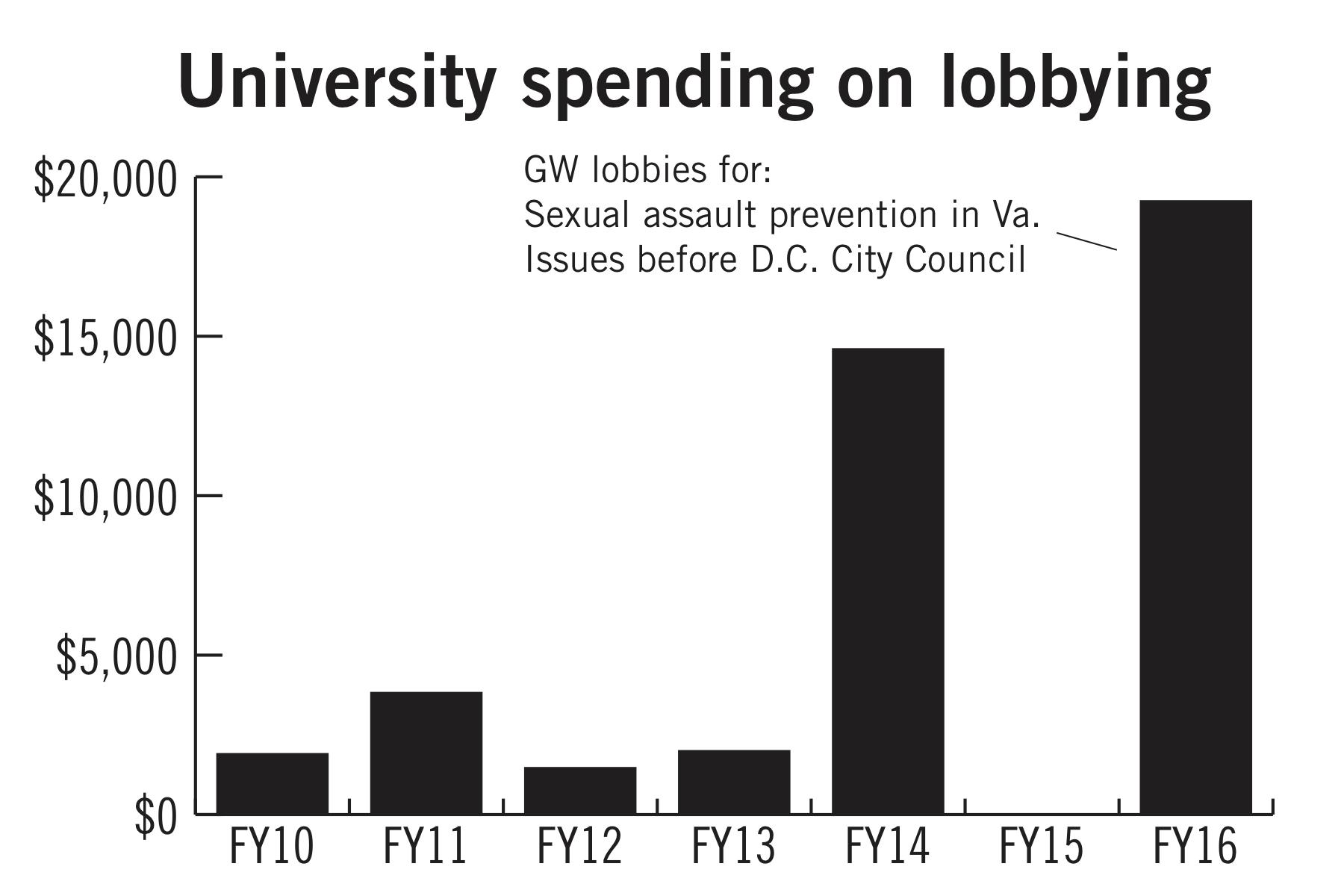Updated: Nov. 17, 2017 at 11:23 a.m.

Yonah Bromberg Gaber | Graphics Eidtor
Source: University 990 Forms
The University spent more on lobbying in fiscal year 2016 than any other year in at least the last six years as it sought information on a sexual assault prevention bill in Virginia.
GW spent $19,241 on lobbying in 2016, after spending nothing in fiscal year 2015 and $14,602 in fiscal year 2014, according to tax documents. Experts said the increase goes against a national trend of universities spending less to lobby the government, but GW still spends much less than most of its peers.
University spokeswoman Maralee Csellar said last year the University spent lobbying money to learn more about the impact of a Virginia law requiring colleges and universities to indicate on a student’s transcript whether they were expelled or suspended for a sexual violence allegation.
GW adjusted its policies after the law went into effect in October 2016 because it has properties in the state, including the Virginia Science and Technology Campus.
Csellar said the University also used lobbyists to talk to staff in the D.C. City Council about issues involving universities, but she declined to say what these issues were.
GW was part of a lobbying group that worked against a paid family leave bill in the D.C. Council last fall. The group introduced its own proposal that gave eight weeks of paid leave instead of the 12 that the Council later approved.
There are now two lobbyists registered to advocate for interests of the University – one in Virginia and one in D.C., she added. Csellar said the University still has relationships in the federal government but has not officially lobbied Congress, deferring to groups like the American Council on Education and the National Association of Independent Colleges and Universities.
“Congressional legislative priorities, however, have changed over the years, and there have not been pressing priorities for GW to weigh in on individually at the federal level and, as such, the university has not engaged in federal lobbying as defined under applicable law,” Csellar said in an email.
Csellar declined to say where lobbying dollars were being spent during the current fiscal year or if the University would be engaging in lobbying activities at all this year.
“We will continue to monitor issues that may affect our campus community and engage in appropriate activities as needed,” she said.
James Dyke and Tracy Baynard were registered lobbyists for GW in the Virginia legislature for 2015-2016, according to the Virginia state database. The lobbyists are both from the law and consulting firm McGuireWoods.
The two were working with GW on issues concerning higher education, economic development, legislation and energy policy, according to the database.
John Wonderlich, the executive director of the Sunlight Foundation, an open government advocacy organization, said lobbying in the past decade has dramatically increased for universities, which are becoming increasingly larger financial entities.
But GW has historically spent drastically less than its peers on lobbying efforts.
On average, 17 of GW’s 18 peer universities, where recent data can be obtained, spent $260,814 annually in fiscal year 2016, according to tax documents. Northwestern University spent the most with $693,210. Georgetown University, which spent nothing on lobbying last year, was the only university that spent less than GW.
Typically universities spend money on lobbyists to push favorable tax and financial aid policies and other issues that affect their finances, he said.
Wonderlich said $19,000 was a low number for a major university like GW to spend on lobbying.
Universities had adopted more of a corporate mindset in recent years, behaving more like hedge funds or banks, making them more likely to lobby the federal government.
Dan Auble, a senior researcher at the lobbying database Open Secrets, said there has been a general decrease in lobbying across all sectors because of the financial crisis in 2008 and particularly for universities.
A decade ago, he said lobbying peaked for colleges and universities because legislators introduced several bills that could have had a major impact on universities. There haven’t been those types of bills introduced lately, he said.
There has also become a greater stigma associated with lobbying in recent years, as it’s become connected with crooked politics in the eyes of many, he added.
“Lobbying has kind of gotten a bad reputation,” Auble said. “Some people have maybe backed off of that.”
This post was updated to reflect the following correction:
The Hatchet incorrectly reported that the University lobbied in support of a Virginia sexual assault bill last year. Officials paid lobbyists for information about the impact of the bill at GW, but didn’t take a position on the legislation. We regret this error.




